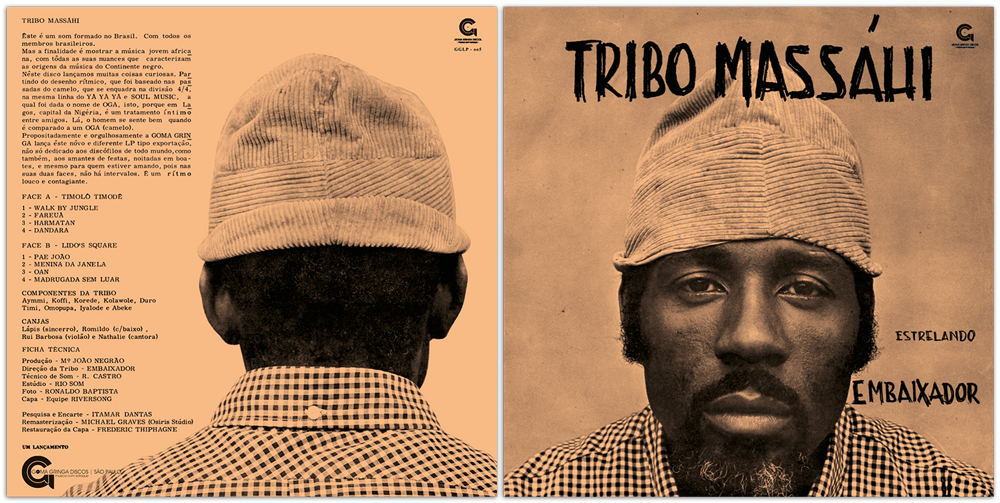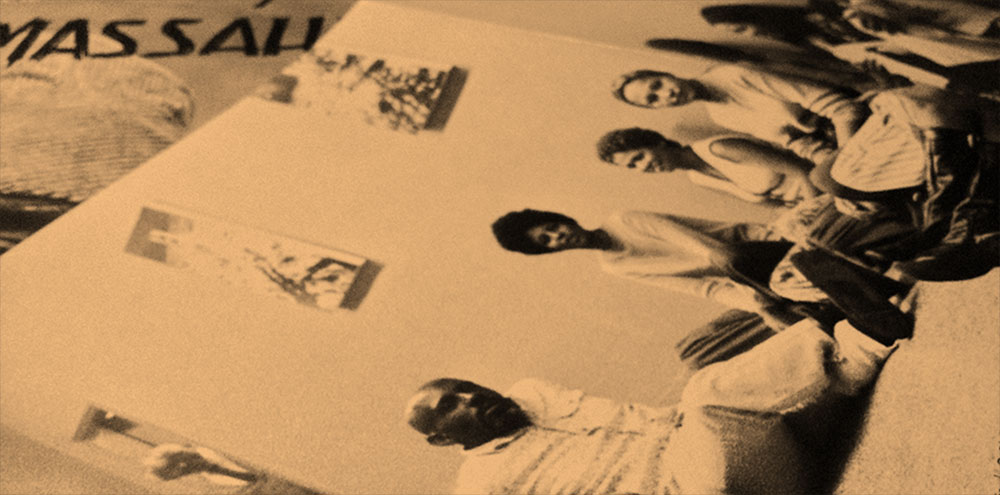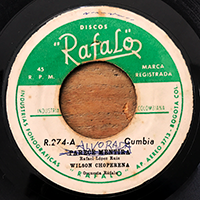
But besides his hard to define sound - "Afro-Brasilian psych-funk fusion" to quote Now Again - a quite singular point about that LP is that until today, almost nothing was known about it or about the leader of the band, Embaixador. That was before one guy, Itamar Dantas, Brazilian journalist, decides to make the job and unscramble the story behind Embaixador and his band.
Along with the full remastered B side of the record, we are pleased to offer you, exclusively, the complete English version of the liner notes that came with the reissue! Enjoy!

Freshly re-issued by São Paulo based record label Goma Gringa, Tribo Massáhi is considered as the Brazilian Holy Grail by records collectors around the globe.
But besides his hard to define sound - "Afro-Brasilian psych-funk fusion" to quote Now Again - a quite singular point about that LP is that until today, almost nothing was known about it or about the leader of the band, Embaixador. That was before one guy, Itamar Dantas, Brazilian journalist, decides to make the job and unscramble the story behind Embaixador and his band.
Along with the full remastered B side of the record, we are pleased to offer you, exclusively, the complete English version of the liner notes - signed by Itamar himself - that came with the reissue! Enjoy!
a text by Itamar Dantas - February 2015 - São Paulo
Tribo Massáhi - Estrelando Embaixador, is a record that has become legendary among records collectors and researchers in Brazilian music ... The LP, recorded in 1970, is nowadays very rare and its few existing copies are sold at high prices around the world.
The record’s characteristics, both acoustic and aesthetic, have helped to consolidate a myth. Tribo Massáhi – Estrelando Embaixador was recorded in two long continuous tracks, side A and side B, about 14 minutes each, where you can hear songs with a pop footprint and strong African influences, "a crazy and contagious rhythm," according to the LP’s liner notes. "This is a sound made in Brazil. All the members are Brazilians. But the goal is to show the young African music, with all the distinctive features that defines the black continent’s music.
One of the mysteries that has always surrounded Tribo Massáhi – Estrelando Embaixador concerns its main character. Among the record’s fans, it was only known that Embaixador participated in a film along with Roberto Carlos - Roberto Carlos em Ritmo de Aventura - that promoted the 1968 self-titled album. Embaixador was a villain who ran after Roberto Carlos in the shallow script and kitch movie. With this, Embaixador also had his photo appear on the VHS tape backcover, a shot in which he is seen fighting with the heartthrob Roberto Carlos in one of the film’s memorable scenes.
Ruy Ipanema, a guitarist who knew the singer in the early 1960s and took part years later in the recording of the album Tribo Massáhi, explains the excitement that accompanied Embaixador role in the Roberto Carlos movie: "Man, I loved Embaixador. He would go to the cinema, stay in front of the box office, but did not enter. It was to be recognized by people when they looked at the poster: 'Is that you?' He was so proud. He was such a figure..."
Another famous rumor about the singer and leader of the Tribo Massáhi is that he was the brother of Tony Tornado, a fact contested by the baptism names of both actors/musicians. Embaixador was the son of Geraldo Rosa de Oliveira and Joaquina Rosa de Oliveira, Minas Gerais. While Tony Tornado is from the Vianna Gomes family, from the interior of São Paulo.
- Sebastião Rosa de Oliveira – the Embaixador -
While researching the reissue this record, Embaixador’s still unknown name came up in the midst of chat between the researcher and sambista Nei Lopes: "Do you know a musician and actor who was known as Embaixador? Yes, of course I knew him ... He was a great friend! Sebastião!" This was the missing key that unravelled the story of the singer.
Sebastião Rosa de Oliveira was born in Leopoldina, Minas Gerais, on the 10th of September 1934. Son of Geraldo Rosa de Oliveira and Joaquina Rosa de Oliveira, he was still a young man when he moved with his family to Rio de Janeiro, where they ended up settling.
It was alongside the poet Solano Trindade that Embaixador took his first steps as an actor. His first television work came in the late 1950s, for the late TV Tupi. Very perky , Embaixador soon went on to make appearances on shows and to enlist black friends in small television features.
Embaixador’s nickname comes from his fluency in other languages. He communicated well in English and had the basics of other languages. Always a part of the nightlife, Embaixador was constantly seen in the Beco da Fome, in Copacabana. There, many foreign actors gathered in search of employment opportunities. His resourcefulness allowed the artist to communicate with them and get them some work on television. However, it was in music that Embaixador felt most accomplished.
In the second half of the 1960s, the musician set up the band that would immortalize him posthumously: Tribo Massáhi. In 1970, a result of one of his many friendships, Embaixador got the studio Rio Som to record his LP. But it would have to be done in one day. He called the musicians, scheduled an hour and, on the appointed day, everyone was there to record.
"Everything has been combined at the last minute. He warned us on the weekend that we’d have to go on Wednesday to record. 'They showed up in the studio on the Senado Street'. I never saw $1 of that recording," says Ruy Ipanema, a guitarist that appears in the album credits as Rui Barbosa, his birth name.
With compositions of Embaixador himself, José Prates, Heitor da Costa, Wilson Guimarães and Rui Barbosa, the LP was recorded. Ruy Ipanema says that the recording was quite improvised. "There aren’t no arrangements on sheet music and stuff. It was at most a sketch of the song and let's go! The recording lasted all day", he recalls. In the recording, the guitar was led by Toninho Mil Acordes. Aladim commanded the drums. Ruy Ipanema played the guitar on some songs, including on his own, “Madrugada Sem Luar".
The band members were renamed in Nagô dialect (which has made it quite difficult to conduct research related to the band over the years). Present during then recording of the LP were Aymmi, Koffi, Korede, Kolawole, DuroTimi, Omopupa, Iyalode and Abeke. Also participating in the jam session were the musicians Lápis (cowbell), Romildo (contrabass), Rui Barbosa (guitar) and Nathalie (voice).

It was on one of his visits in the Morro da Providência to fetch pot that Ruy was caught red-handed. From there, he was sentenced to one year in prison in the penitentiary Hélio Gomes. His copy of the LP Tribo Massáhi came to the jail, delivered by Embaixador. "He went to visit me only once during the time I was in prison", says the musician.
- The near success on festivals -
The band's activitiescontinued. In 1971, the group participated in the Festival Internacional da Canção presenting the song "Karany Karanuê", written by Diana Camargo and José de Assis. With its upcoming participation, the group began to get mentions in newspapers.
However, the presentation of the music at the festival did not come to pass. The newspaper O Globo, of September 23rd, 1971, reported the absence of the band at the rehearsal for the official presentation. "The song 'Karany Karanuê', from Diana Carmago and Zé de Assis, should have been rehearsed by the Tribo Massáhi, but its members did not show up and Diana alone sang", reported the paper. The song was finally performed a few days later by Elson, Myrna and Diana herself, becoming finalist of the contest and being recorded and released as a 7-inch in the same year.
After 1972, there is no more information about the Tribo Massáhi. From the band formed by Embaixador remained the iconic LP and a 7-inch recorded in São Paulo with the participation of the pianist Luiz Mello. Later in this same year, Embaixador created the band Trio Moenda, which played in a hotel in Rio de Janeiro and then travelled to Philadelphia under the name of Brasil Moenda Trio. There, however, the band only lasted six months and Embaixador stayed in the United States working as a designer, another of his artistic talents.
In 1985, Embaixador took part in the movie Quilombo, directed by Cacá Diegues. In that work, he played the role of Congo, one of the black leaders of the Quilombo dos Palmares. Then, he acted in the series Tenda dos Milagres, based on the work of Jorge Amado, where he performed as Xangô.
In the late 1980s, acting work was scarce and the financial position of Embaixador becamestrained. Without money, after getting divorced from his wife, he turned to a friend who invited him to the Morro do Fubá, where the musician had a shack at his disposal and a machine to make silkscreen printings and small sewing works. In his workshop, he made stickers, banners, and cut molds for clothes.
At this time, he also worked on Adelzon Alves’s radio show that was broadcasted daily by Radio Globo. Even in a difficult situation, the musician kept building projects and working artistically. In an edition of the newspaper O Globo dated on October 13rd, 1989, the musician talked about his dream of building a music market in Rio de Janeiro. He was working to present his project to the mayor of the city.
In 1994, Embaixador was taken into the Retiro dos Artistas,an institution in Rio de Janeiro hosting aged artists with financial difficulties. There, he spent the rest of his days. He came to the institution without any goods, only with the clothes on his back. Hee had no family visits, but did fall into sorrow. He was always singing and telling stories.
However, at 60 years old, his health was not great. Two years after his arrival, on the 27th of December 1996, the musician died of an acute heart attack. At his funeral, only some friends from the Retiro dos Artistas and acquaintances showed up. Without recognition of his work during his lifetime, it is almost 20 years after his death that the story of his record was unveiled and his memory was honored with the first official reissue of his work. Long live the work of Sebastião, Embaixador, which is now enjoying wider circulation. May your thoughts feed other dreamers around the world!
Grab your copy HERE or on the Brazilian version of the site.


No comments:
Post a Comment